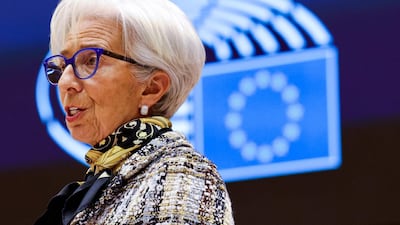The European Central Bank kept its stimulus package and interest rates unchanged on Thursday, as it said the pace of purchases under its pandemic bond-buying programme will be “significantly higher” in the next quarter.
ECB president Christine Lagarde held the pandemic emergency purchase programme (Pepp) at €1.85 trillion ($2.2 trillion), following a €500bn boost in December, and reiterated that it will run until at least March 2022, or "until it judges that the coronavirus crisis phase is over".
“Based on a joint assessment of financing conditions and the inflation outlook, the Governing Council expects purchases under the Pepp over the next quarter to be conducted at a significantly higher pace than during the first months of this year,” the ECB said.
“The Governing Council will purchase flexibly according to market conditions and with a view to preventing a tightening of financing conditions.”
Europe has been hit hard by the pandemic with the region still facing a raft of restrictions as the number of Covid-19 cases remains high. Ms Lagarde said in January that the lender hopes 2021 remains the year of recovery, with the first phase of the rebound loaded with uncertainty as the vaccination drive gets underway and the second centred on countries opening up.
The ECB's pledge to ramp up its buying of government debt in the coming months will help to contain rising bond yields that have threatened to derail the region’s economic recovery and soothe investor concerns.
The new strategy came after a jump in global government bond yields driven partly by the fast economic recovery in the US from the crisis, which has boosted inflation expectations.
Yields on long-term government bonds have risen by about 0.3 per cent since the start of the year in the eurozone, with the ECB keen to avoid any premature tightening of credit at a time when the economy is fragile.
Ms Lagarde said the rise in market borrowing rates posed "a risk" to the recovery and said “if left unchecked, could translate into a premature tightening of financial conditions for all sectors of the economy. This is undesirable".
European bonds rose on Thursday following the ECB statement, with Italian securities leading the move higher and 10-year yields dropping 10 basis points.
Meanwhile, the ECB also held the deposit rate at minus 0.5 per cent and will continue providing long-term loans to banks.
Andrew Kenningham, chief Europe economist at Capital Economics, said the bank's statement was "more dovish" than expected.
Naeem Aslam, chief market analyst at Avatrade, said the dovish narrative pushed the euro lower against the dollar.
The currency extended gains after the report, rising 0.4 per cent to a high of $1.1973.
Mr Aslam said the only element in the ECB’s strategy that could be considered slightly hawkish, was the fact the lender thinks the Pepp may not be fully used if conditions are favourable.
“The envelope need not be used in full” if favourable financing conditions can be maintained, the ECB said.
“Equally, the envelope can be recalibrated if required to maintain favourable financing conditions to help counter the negative pandemic shock to the path of inflation,” it added.
Mr Aslam said this particular statement will “provide support for the euro which has been under tremendous pressure lately".


